2026 Author: Priscilla Miln | miln@babymagazinclub.com. Last modified: 2025-01-22 17:55:29
At the age of 5-6 months, the child begins to develop an interest in adult food. He can watch how adults take it, open his mouth, pull a spoon towards him. This suggests that the child's body begins to give signals about the readiness to change the usual diet. This is also evidenced by the skills of the crumbs, in particular, the ability to take objects with the thumb and forefinger, hold pieces of food with them and draw them into the mouth. Most often, cereals are included in baby food, since they are the sources of useful elements for the baby. The article will consider the types of such products and parental reviews about it.
Weaning age
The advice of pediatricians regarding the first introduction of products as complementary foods is based on the recommendations of the World He alth Organization and the Russian Ministry of He alth. It is recommended to start with hypoallergenic porridge, especiallywhen it comes to children prone to negative reactions to any products. As a rule, the introduction of solid foods into the diet of a child begins at 4-6 months. This condition is relevant when the baby is ready to receive additional products.
You can understand this by the following features:
- Readiness of the brain and nervous system (explained by the fact that babies up to 5-7 months old have a reflex in which solid food is pushed back by the root of the tongue. By the indicated time, it gradually fades away, and the baby begins to react differently, when pieces of food enter the mouth).
- Maturation of the gastrointestinal tract (by 5-7 months, beneficial enzymes begin to form in the stomach - enzymes that help digest solid food).
Other reasons such as age, ability to sit, presence of first teeth, underweight, supplementary feeding should not be taken into account. Many mothers are faced with a template appointment for the start of complementary foods. Doctors suggest starting with hypoallergenic cereal to minimize the risk of developing an unwanted food reaction. Moreover, compared to other products, they are highly digestible.

Types and differences
In the retail network you can find a large selection of hypoallergenic baby cereals for every taste. The first three types of cereals are not offered by chance, as they are well tolerated. These are corn, buckwheat and rice. Reviews of pediatricians boil down to the fact that this product is quite energy-intensive for the child's body, and therefore itused in small quantities. This is especially true for breastfed babies.
For formula-fed babies, introducing hypoallergenic porridge as complementary foods can serve as an additional source of useful vitamins and minerals. Enriched with valuable components, they carry probiotics, omega-3 fatty acids necessary for the developing organism.
Porridges are especially distinguished, which have several different cereals in their composition. In terms of benefits and nutritional value, they can serve as a competitor to many similar one-component products.
Features of each cereal
It is worth paying attention to reviews of hypoallergenic cereals, in particular, to what benefits certain cereals have. Below are the characteristics that are given to these products by the parents of babies:
- Many people allocate rice groats. It is one of the most low-allergenic, helps to strengthen and cleanse nerve cells, does not contain gluten, but can strengthen the stool and cause constipation.
- Gluten-free also includes buckwheat, it is easily absorbed by the body, does not cause an allergic reaction.
- Corn grits help to eliminate constipation, cleanse toxins, and normalize the digestion process.
- Barley strengthens the immune system, cleanses the body, is well absorbed.
- Oatmeal contains gluten, but at the same time improves immunity, increases vitality.
- Wheat porridge is also easily digestible, but has gluten in its structure, favorably affects the processhematopoiesis and memory improvement.
- The most allergenic porridge is semolina, but at the same time it is low in calories and promotes proper bowel function.
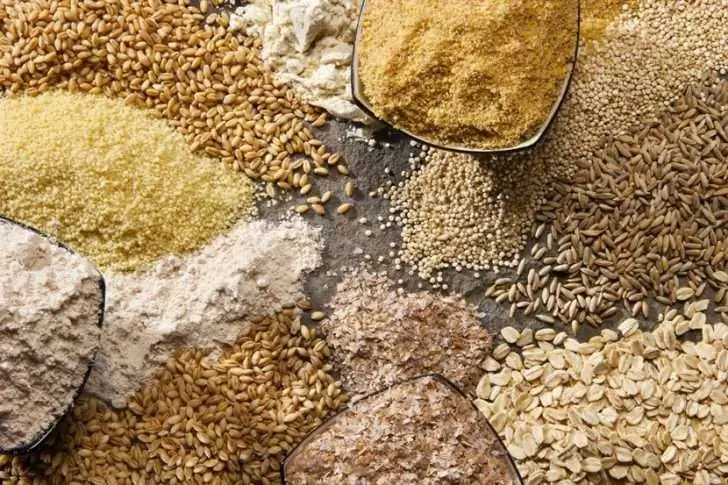
Reasons for choosing special porridge
Each manufacturer tries to describe their product from the best side, but there is nothing more reliable than personal experience. Therefore, when choosing hypoallergenic porridge, many parents rely on the reviews of more experienced ones. This allows you to determine the features and benefits of each product at minimal cost. Speaking about it in general terms, it is worth noting the convenience of preparing cereal from a reliable manufacturer (in particular, it does not require cooking).
In numerous reviews there are comments that in cereals that are specially designed for baby food, cereals are carefully controlled. This allows you to be sure about the quality of the purchased products. It is also safe to say that most brands offer cereals based on pure raw materials, without GMOs, artificial additives, s alt and colors.
How to choose a manufacturer
Undoubtedly, it is worth giving preference to well-known and long-standing manufacturers on the baby food market. Do not save on quality, as this may affect the he alth of your baby. And yet, questions remain regarding which hypoallergenic cereals are suitable for a baby, how to choose a good product?
The main attention should be drawn to the packaging and a full description of the product, its composition,availability of exact location coordinates and communication with the manufacturer. The absence of any of these items, a crumpled or opened box should alert.
Studying composition and age compliance

Products intended for the first complementary foods should not contain flavoring additives, flavor enhancers, sugar. Since the first cereals are introduced into the baby's menu at the age of one, this is especially important. The earliest hypoallergenic cereals are rice and buckwheat. Their pediatricians recommend introducing from four months. At five, you can start trying a new corn-based product. Such porridge in finished form is similar in consistency to semolina.
In addition to age, you should pay attention to the following types of products:
- Dairy-free - suitable for children whose body does not digest cow protein from birth.
- Dairy - for babies who do not suffer from food allergies and their body absorbs this product well.
- Based on fermented milk components - can be offered to children who are already accustomed to such a diet and an adult wants to add variety to their diet.
Modern producers offer drinking cereals that come in cardboard boxes like juice or plastic jars like yogurt. From the first year of life, you can introduce multicomponent products into the baby's diet, with pieces of berries and fruits, pre- and probiotics.
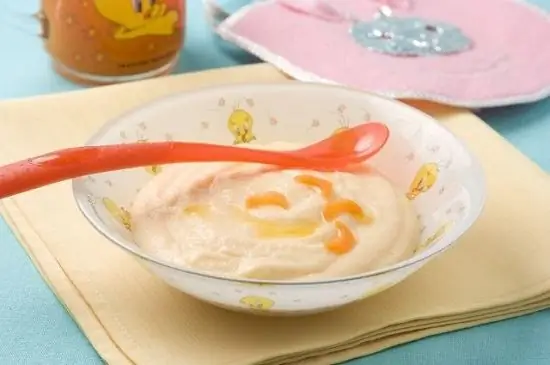
Dairy Free
Choosing hypoallergenic porridge forchildren, parents are advised to start with dairy-free. This is due to the fact that the composition of such products is perceived by the child without the risk of a negative food reaction in him. Dairy-free cereals do not contain sugar, flavor enhancers, fructose. This reduces the risk of negative effects on the gastrointestinal tract of the child. Also, do not lose sight of the category of babies who suffer from infectious diseases of the intestine or lactase deficiency in infancy.
Among the representatives of baby food companies are: Frutonyanya, Nestle, Malyutka, Babushkino Lukoshko, Hipp, Bebi, Heinz, Fleur Alpine Organic, "Baby Sitter", "Winnie", "Agusha". At the time of buying porridge of a particular brand, you should pay attention to the composition. Some manufacturers indicate a slight presence of milk in their products. This may be an important deterrent for consumers with lactose intolerant children.

Milk Based
The situation is much easier with the introduction of porridge into complementary foods for children who are not dependent on food reactions or lactase deficiency. Therefore, in this case, it may turn out that each hypoallergenic porridge is the best. And this is a definite plus, since the choice for parents is not limited to any one manufacturer or type of cereal. Here you can pay attention to the preference of the baby.
The following producers offer porridges on a milk basis: "Agusha",Frutonyanya, Nestle, Bebi Premium, Bibikol, Nutrilon. These manufacturers have positively proven themselves not only in terms of sales, but also in the reviews of parents. It is worth noting that the main feature that mothers pay attention to is the good solubility of porridge, the absence of lumps in the cooking process, sugar and aromatic additives. Another important factor is the price, which determines the choice of a particular brand.
Gluten Free
A separate category of products is the absence of gluten in porridge. This is a protein that is of plant origin. Its high content is noted in such cereals as oats, millet, wheat, barley. Despite the fact that it is useful for the body, at the same time it is a product that is difficult to digest. Therefore, for babies under one year old, it is better to exclude the presence of this ingredient.
As one of the side effects after eating products containing gluten is the appearance of symptoms of gas formation. The baby may begin indigestion, bloating.
There is also a small percentage of people whose bodies are unable to absorb gluten. A disease that has an established diagnosis is called celiac disease. The peculiarity lies in the hereditary nature of this disease. Therefore, parents who have a history of this disease are careful about choosing gluten-free cereal.
Judging by the reviews of mothers, the following brands can be distinguished: Baby Sitter, Vinnie, Grandma's Basket, Frutonyanya, BelLakt, Agusha. You should start with buckwheat,rice or corn porridge, the age of entry as complementary foods is from four months.
Fleur Alpine
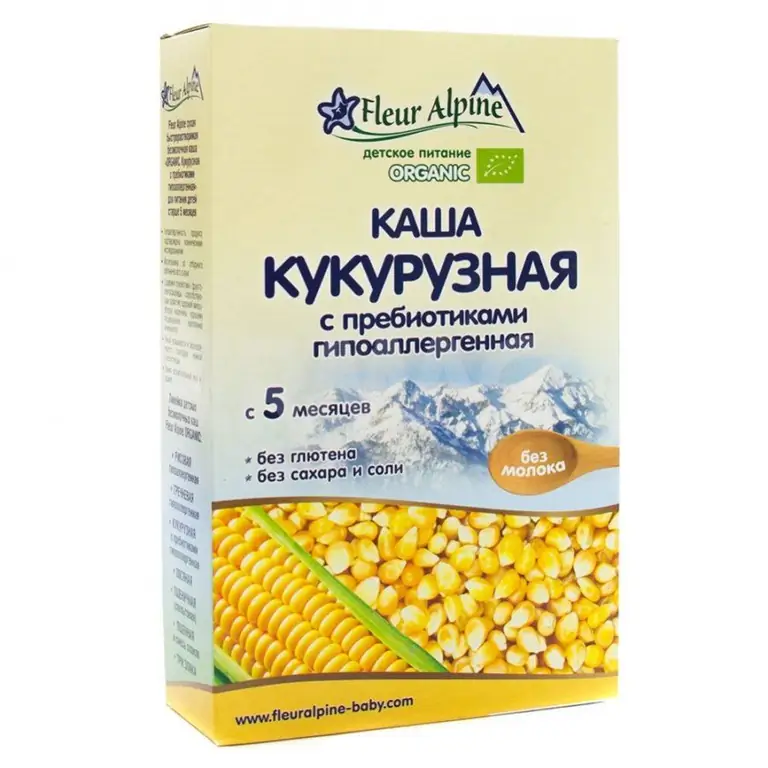
It is worth highlighting a wide range of products from the manufacturer "Fleur Alpine": hypoallergenic buckwheat porridge, rice (including those based on cow's and goat's milk), wheat porridge with goat's milk. They are available for introduction as complementary foods to children from four months. A little later, it is recommended to introduce: oatmeal in goat's milk, as well as with a pear; corn with prebiotics. From six months, the manufacturer offers a variant of a mixture of two cereals: oatmeal and barley flour. The product contains whole milk powder and m altodextrin, whole grain spelled flour. Starting from the age of ten months, porridge is offered based on wheat and oat powder, with the addition of apple and banana pieces, vitamin B1.
Nestlé
Numerous reviews of experienced users boil down to the fact that preference is given to Nestle hypoallergenic cereals: buckwheat, rice, corn. This manufacturer offers three categories of cereals that can be selected for babies of any age:
- Dairy-free: Buckwheat, corn, oatmeal, multi-grain (5 grains) and rice.
- Dairy: corn, buckwheat, rice, wheat, oat (also with banana and pear), multi-grain (with apple, raspberry and blueberry, peach and pear, apple and banana).
- "Pomogayka" dairy-free porridges: with lime blossom "Happy Dreams", 5 cereals, wheat and oats with prunes. This line containsalso yogurt dairy products with 3 types of cereals and different fillings (apple and pear, strawberry and banana).
- "Shagayka", from twelve months, dairy and 5 cereals: peach, apple, garden strawberry, raspberry, pear.
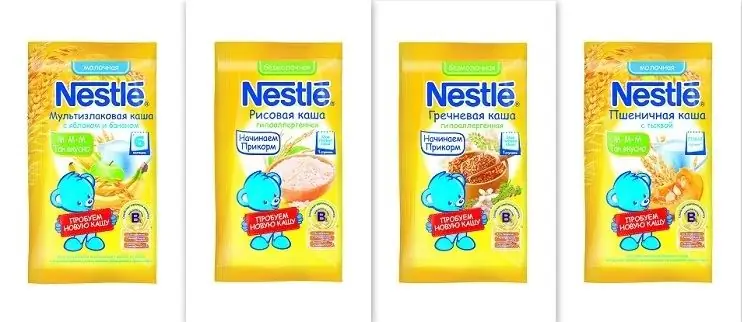
Ready-to-eat porridge
To help out a mother on the road or an adult while caring for a baby, cereals already cooked and packed in small containers such as jars or boxes of tetra packs can help out. In their composition, they can have fruits and berries, yogurt, cottage cheese, several types of cereals. It is necessary to responsibly approach the choice of such a product. The peculiarity is that such porridge has a short shelf life, and only a few hours when opened.
Finished products are very convenient to take with you on the road or when you go to visit. Among the brands popular with moms are:
- "Frutonyanya" - 5 cereals with prunes (recommended from six months, before going to bed, improves digestion); oatmeal - with banana, apple and berries; rice - apple and apricot, wheat and fruits, apple and buckwheat; "Before bed" - rice with raspberries, wheat.
- "Agusha" - with prebiotics and vitamin complex: oatmeal with raspberries, wheat with pumpkin, cereals.
- "Backfill" - pear and banana, rice;
- "Themselves with a mustache" - in milk with inulin rice, wheat (including pumpkin), 5 cereals, rice-corn with banana.
- "Bellakt" - buckwheat (including dairy-free), multi-cereal;
- "Heinz" - 5 cereals.
The above products contain milk.
Parents' opinion
Reviews of parents in most cases are based on the recommendations of doctors. It should be borne in mind that it is necessary to start introducing adult foods into complementary foods with dairy-free hypoallergenic cereals: buckwheat, rice, corn, as was written above. Only after looking at the reaction of the child can you add other cereals.
Many people note the positive experience of taking hypoallergenic porridge "Nestlé", "Winnie", "Frutonyan" and other popular brands.
Doctors advise paying attention not only to the price, but also to the composition. It determines the admissibility of introducing this product into the baby's diet. Particular attention should be paid to the expiration date when it comes to the finished product, the integrity of the package and the absence of swelling of the lid. Any signs that indicate poor quality or damage to the product should alert the buyer.
Recommended:
Identification and development of gifted children. Problems of gifted children. School for gifted children. Gifted children are

Who exactly should be considered gifted and what criteria should be followed, considering this or that child the most capable? How not to miss the talent? How to reveal the hidden potential of a child who is ahead of his peers in terms of his level of development, and how to organize work with such children?
Children's bed side: types, manufacturers and reviews. Children's sofa bed with sides

Choosing the right side for a baby bed means ensuring a he althy and safe sleep for your child. Selection rules, varieties of bumpers and children's fences are covered in the article
Dairy-free cereals for the first feeding: rating, manufacturers and reviews

At the age of 4-6 months, pediatricians advise introducing the first complementary foods. Most often we are talking about cereals and vegetable purees. Some mothers cook their own cereals and vegetables, while others trust the largest manufacturers of baby food. Today you will learn about what dairy-free cereals are. An overview of popular brands will certainly interest new parents
"Heinz", baby food: dairy and dairy-free mixtures, purees, cereals. Reviews
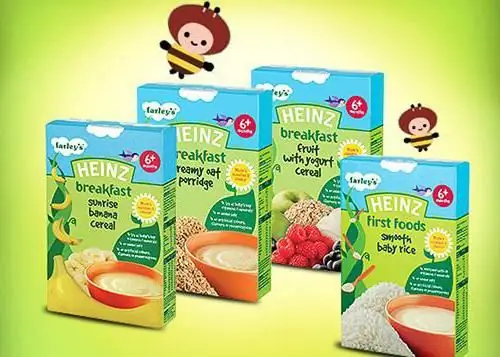
The first complementary foods for babies are usually advised by pediatricians at the age of four to six months, starting with buckwheat porridge. After that, other cereals are gradually added to the child's diet. For the immunity and he alth of the baby, heinz baby food will help. Let's see why it won the hearts of moms around the world
Nestlé porridge: customer reviews. Types and assortment of Nestle cereals

Nestlé porridges have a wide range of dairy-free and dairy products, in their pure form and with the addition of fruits. When buying, pay attention to the steps and series that show for what age the cereals are made and for which children (allergic people, children sensitive to lactose and gluten, etc.). Read more about Nestlé products in the article

